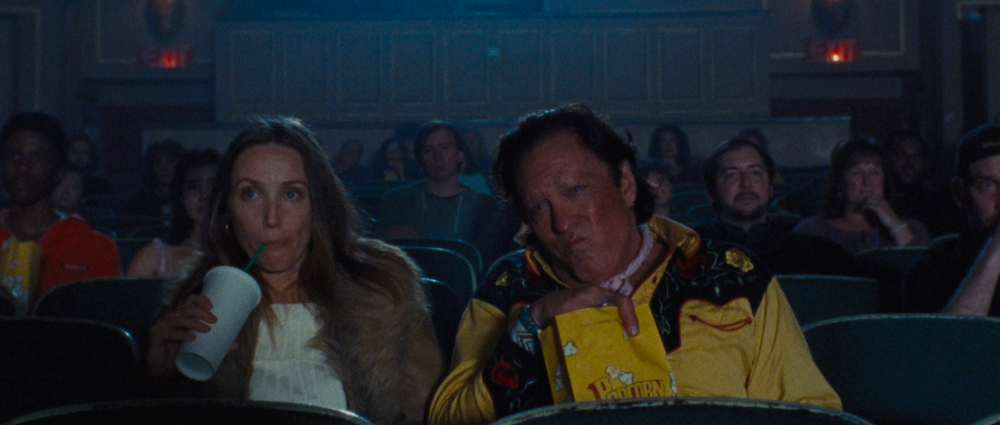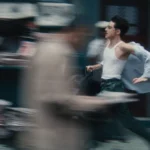It’s a Saturday, and The Royal Alamo, a beloved independent movie theatre, is closing after 52 years. From director Mas Bouzidi, whose initial short was released in 2021, Concessions focuses on the staff and regulars who are all coming to terms with the end of the road in their own ways – these are, amongst others, colleagues-turned-friends Hunter (Rob Riordan) and Lorenzo (Jonathan Lorenzo Price), who have been working there since high school, manager Luke (Steven Ogg), who must face the glaring and disappointed portrait of the founder (his father) in his office, and a washed up stunt double named Rex Fuel, who wants to watch the film he worked on (and let everyone know about it). A fun flick and a celebration of “the movies”, Concessions is also nonetheless a reminder that today more than ever, they need our help. What About Birdy sat down with Bouzidi to talk movie theatres, influences and working with his hero, the late Michael Madsen.
WAB: Concessions is an amalgam of different films, and yet so unique. Did you make an active effort, seeing as the film is so ingrained in the cinematic world, to integrate recognisable styles?
MB: Yes and no. I definitely wear my influences on my sleeve and I think about shots that are directly from other movies. I’m not trying to hide that. We’ll even name the shot after its influence – for example the box office scenes, when Deana and Lorenzo are talking into the camera, that’ll be called a Jonathan Demme shot. Whether it’s a kung fu film or a cool dolly shot or a spaghetti Western for the fake film [in Concessions], it’s all conscious stuff I’m thinking about and having fun including, because it’s related to movies and movie theatres.
WAB: You said you’ve worked in cinemas before.. Are there any experiences from your time there that made it into the film?
MB: I’m trying to think of a PG one! Anything to do with Cheetos popcorn or the cancer jar is directly ripped from my experience working at the movie theatre. There’s a gag as well, where Hunter and Lorenzo are in the theatre together talking about a certain event Ron [the usher] had to clean up – that was also a real incident. You get the best and worst of the human condition working in a movie theatre.
WAB: Hunter distinguishes himself as the pessimistic armchair critic of Concessions. Why did you pick him specifically as a main focus?
MB: There’s a very good argument to make that he is in fact the main character – it’s a tie between him and the manager maybe. They are at two very different points in their lives, but you can see that if they just stopped arguing with each other, there would probably be a lot to relate to. I picked Hunter as the main character because he’s very much that archetypal slacker guy right from a 90s hangout movie. He would be the best friend character, the really pessimistic a**hole type. Always cracking a joke, never taking anything too seriously. So I thought, what if that guy was the main character of the movie? His spirit is in a way tied to this theatre closing, and he doesn’t even realise it. He’s mourning the loss of a place he thinks he hates.
WAB: In addition to Hunter, Concessions is a fantastic mix of eclectic characters whose lives we jump in and out of. What do some of them represent to you?
MB: Rex Fuel for instance is a bunch of different characters taken from my movie loving brain. He’s the tough guy who rolls into town but I turned it on its head – in Concessions, he’s past his prime, he’s a bit of a flirt, but you can tell that back in the day he was the coolest guy in the room. Michael Madsen was our Clint Eastwood, our Robert Mitchum. He’s a legend and a hero of mine, and to work with him on my first movie when I was 22 was insane. I also really love all the stuff in the box office, some of the more sentimental, soft scenes. I’m a big fan of Ron for instance. That’s a guy that I really worked with, and that’s his real name – he’s nowhere near as comatose as Ron in the film though! And there’s also the theatre philosopher that I like a lot, and it wasn’t something that people really understood on the page at first, but once our actor, Greg Roman, came in, he turned it around.
WAB: He reminded me of The Narrator in Wes Anderson’s Moonrise Kingdom.
MB: For sure, Wes has an influence on this, and it’s obviously because he’s pulling a lot of things that I’m pulling from as well, like 60s French Cinema. It’s super irreverent, breaking the fourth wall, whips and pans, stuff like that.
WAB: There’s also a lot of focus on time. Cinema has always had a nostalgic vibe to it, but there’s also the concept of letting go of the past, and the quote that “the future starts today”. How does this tie in with the film’s message about the role cinema plays in our society?
MB: The movie is definitely about being out of time, or thinking your time is gone in some ways. It’s certainly optimistic in the sense that there’s always a next day, a morning to come. But I think there are two ways to view it. It could be a eulogy to the moving going experience, or a call to action. My dream is that if you’re watching this at home, you decide you want to go see it in a movie theatre instead – buy a ticket, go see a movie, and then see another movie right after!
WAB: Any New York movie theatres to recommend?
Film Forum. The Metrograph and the Roxy are also really great. Definitely go to AMC Lincoln Square if you can, it’s one of the biggest IMAX screens in the world. There’s no shortage of great theatres, it’s very easy to live in the city and think there’s no problem, because movie theatres always packed there. It’s really anywhere not in a major city where they’re quickly emptying and shutting down. I would love for Concessions to be this call to action for people – it’s definitely a dire time for the theatrical experience. If that’s the one reaction people have to this movie, then I’m happy.
Concessions screened at the Edinburgh International Film Festival.





